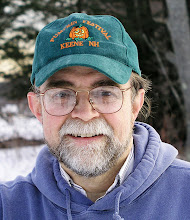 |
| "Snowliage" Canon 5D 16-35mm Lens |
 |
| Canon G11 |
After it became evident that no amount of drying would restore reliable function, I sent the camera and lens off to New Jersey. The service center did a prompt and professional job. I got the camera back in about two weeks in "factory condition" which means that, in addition to the repairs, the camera and lens were cleaned and calibrated. It was of some consolation to discover that my first images had absolutely no dust on the sensor. That won't last.
 |
| Canon G11 |
of scrupulous care of the equipment. The fact that this disaster struck at the best moment of this year's fall foliage only magnified the impact. The late October snow spotlighted the previously dull color and provided a spectacular conclusion to the season that I was afraid I would miss in my crippled state. If there was one positive aspect of the experience, it was the fact that I was evicted from my usual comfort zone and forced to use back-up equipment. The great lesson turned out to be that it is refreshing to work within different restraints imposed by more limited resources and to be reminded that it is the light and not the equipment that is always most important. Of course I was not terribly impoverished when it came to equipment options. I didn't have to dig out my old Kodak Instamatic.
 |
| Harvey Pond, Westmoreland, NH Canon 5D, 16-35 mmm |
 |
| Roads End Farm Pasture Canon 5D, 400mm |
 |
| Canon G11 |
 .For more complete coverage, my other camera choice was my Canon G11. I got this camera as a relatively small "carry around" that I could keep with me whenever I didn't want to lug my trailer load of equipment. The G11 is a surprisingly versatile camera with a full range of manual controls and raw capability. The image quality is also excellent especially in good light. During the last few weeks I have become more comfortable with the camera's occasionally confusing menus and buttons and found it liberating to have all that power in such a small package nestled in my hand. The G11 does not have the fine focus control, resolution, or low light capability of the Mark II, but I was surprised to find myself a little disappointed when I finally gave up the camera's easy portability for my massive, neck straining DSLR.
.For more complete coverage, my other camera choice was my Canon G11. I got this camera as a relatively small "carry around" that I could keep with me whenever I didn't want to lug my trailer load of equipment. The G11 is a surprisingly versatile camera with a full range of manual controls and raw capability. The image quality is also excellent especially in good light. During the last few weeks I have become more comfortable with the camera's occasionally confusing menus and buttons and found it liberating to have all that power in such a small package nestled in my hand. The G11 does not have the fine focus control, resolution, or low light capability of the Mark II, but I was surprised to find myself a little disappointed when I finally gave up the camera's easy portability for my massive, neck straining DSLR. |
| Multi image depth of field with the Canon G11 |
 |
| Canon G11 |
Of course I am thrilled to have my camera back, but I should mention one final lesson from this episode. It was in fact a good thing that I bought camera insurance!

Nice writing! I'm a big fan of your work.
ReplyDelete